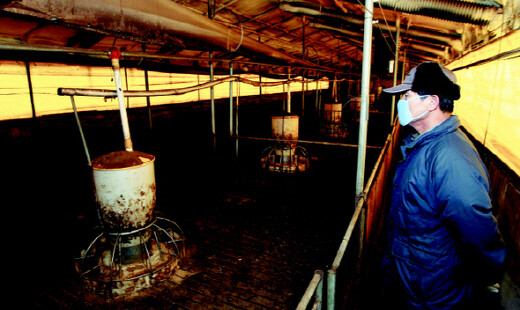hankyoreh
Links to other country sites 다른 나라 사이트 링크
Guilt and nightmares accompany oversight of animal slaughters

Park Kyung-man, Senior Staff Writer
“A veterinarian should be saving lives. It is painful to have to end them.”
With foot-and-mouth disease spreading nationwide, the public health officials in charge of disposing of livestock have been having a trying time both physically and emotionally.
When she met with the Hankyoreh on Thursday at the foot-and-mouth disease quarantine headquarters in Paju, Gyeonggi Province, Baek Hye-ryeon was on her 22nd day of battling the disease. Baek has been working day and night while bunking at an inn since being sent to the area on Dec. 16. Baek, a 37-year-old veterinarian on the livestock quarantine team for the province’s Gyeonggido Veterinary Service 2 (GVS2), said that at the beginning she was staying up until 4 to 5 a.m. every night.
Baek is the female health official mentioned in the Internet post “Writing by the Son of a Paju Farming Family Whose Animals are Being Slaughtered,” which was all over the Internet just before the New Year.
Baek and around thirty other livestock quarantine officials with GVS2 are the commanders on the scene of the north Gyeonggi Province foot-and-mouth outbreak, assessing the livestock situation and directing the entire process from disinfection to slaughter and burial. Their job includes everything from educating the volunteer workforce, including administrative officials, soldiers, police, firefighters, and civilians, to persuading farmers who object to the preventive slaughter and selecting burial sites.
The mother of an eight-year-old, Baek said that the toughest thing for her has been the slaughtering of suckling calves and piglets. “At times like that, I feel a real sense of doubt about my job, and I sometimes have nightmares,” she said.
Baek also recounted experiencing post-traumatic stress and depression after being mobilized for the slaughter of animals in a January 2010 foot-and-mouth outbreak in Yeoncheon, Gyeonggi Province. Coincidentally, the South Korean cattle farm in question was the same place where she had personally slaughtered animals the year before due to brucellosis, which she said made the aftereffects even greater. Due to her sense of guilt over killing livestock twice at the same farm, she stayed at the farm for three days, weeping and asking to be forgiven. Even after leaving the farm, she recalled, she hallucinated hearing the cries of cattle and pigs for a time and experienced nightmares of being chased by the animals. Today, she is getting through, since it is an urgent situation, but she is worried about the psychological pain she will experience once the situation subsides.
Health officials’ duties themselves are experiencing non-stop tension, as they are exposed to various hazards such as accidents with drugs. Putting down a cow requires the injection of two milliliters of muscle relaxant. Ordinarily, an intravenous injection is lethal within five seconds, and a muscle injection after around one to two minutes. A moment of carelessness could result in being kicked or gored with a horn, and some officials suffer injuries from the needles.
“As a means of preventing foot-and-mouth from spreading, slaughtering is inevitable,” Baek said. “But it is wrong to bury pigs alive like they are doing now.”
However, health authorities’ view is that they do not have enough personnel, drugs, or time to euthanize every one of the thousands of pigs being bred at each farm.
Please direct questions or comments to [englishhani@hani.co.kr]
Editorial・opinion
![[Column] Has Korea, too, crossed the Rubicon on China? [Column] Has Korea, too, crossed the Rubicon on China?](https://flexible.img.hani.co.kr/flexible/normal/500/300/imgdb/original/2024/0419/9317135153409185.jpg) [Column] Has Korea, too, crossed the Rubicon on China?
[Column] Has Korea, too, crossed the Rubicon on China?![[Correspondent’s column] In Japan’s alliance with US, echoes of its past alliances with UK [Correspondent’s column] In Japan’s alliance with US, echoes of its past alliances with UK](https://flexible.img.hani.co.kr/flexible/normal/500/300/imgdb/original/2024/0419/2317135166563519.jpg) [Correspondent’s column] In Japan’s alliance with US, echoes of its past alliances with UK
[Correspondent’s column] In Japan’s alliance with US, echoes of its past alliances with UK- [Editorial] Does Yoon think the Korean public is wrong?
- [Editorial] As it bolsters its alliance with US, Japan must be accountable for past
- [Guest essay] Amending the Constitution is Yoon’s key to leaving office in public’s good graces
- [Editorial] 10 years on, lessons of Sewol tragedy must never be forgotten
- [Column] A death blow to Korea’s prosecutor politics
- [Correspondent’s column] The US and the end of Japanese pacifism
- [Guest essay] How Korea turned its trainee doctors into monsters
- [Guest essay] As someone who helped forge Seoul-Moscow ties, their status today troubles me
Most viewed articles
- 1[Column] The clock is ticking for Korea’s first lady
- 2Hong Se-hwa, voice for tolerance whose memoir of exile touched a chord, dies at 76
- 3After 2 months of delayed, denied medical care, Koreans worry worst may be yet to come
- 4[Column] Has Korea, too, crossed the Rubicon on China?
- 5Samsung barricades office as unionized workers strike for better conditions
- 6US overtakes China as Korea’s top export market, prompting trade sanction jitters
- 7All eyes on Xiaomi after it pulls off EV that Apple couldn’t
- 8[Guest essay] How Korea turned its trainee doctors into monsters
- 9[Editorial] As it bolsters its alliance with US, Japan must be accountable for past
- 10[Correspondent’s column] In Japan’s alliance with US, echoes of its past alliances with UK